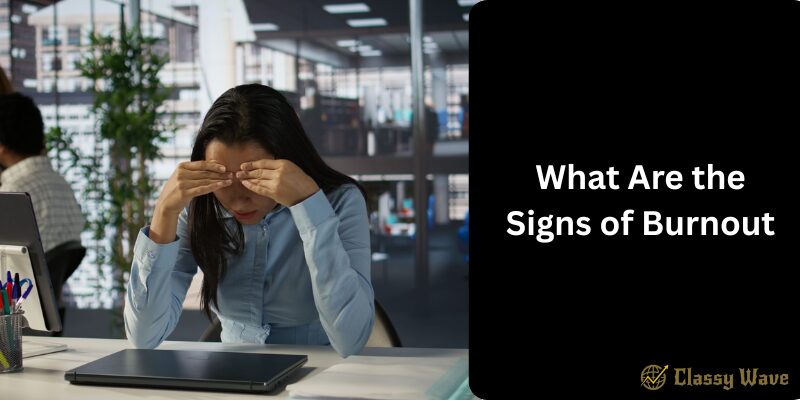What Are the Signs of Burnout | Classy Wave
Have you ever felt completely drained, unmotivated, and emotionally detached from your work or daily life? You might be experiencing burnout — a state of physical, emotional, and mental exhaustion caused by prolonged stress. It doesn’t happen overnight; it builds up slowly and can affect anyone, from professionals to parents, students, and caregivers. Recognizing the signs early can help you take action before it leads to serious health issues.
Understanding Burnout
Burnout is more than just being tired. It’s a condition where constant stress leads to emotional fatigue, reduced performance, and even a loss of purpose. The World Health Organization (WHO) classifies burnout as an “occupational phenomenon,” meaning it’s directly related to chronic workplace stress that hasn’t been managed properly. However, it can also affect personal life, relationships, and overall well-being.
Common Signs of Burnout
1. Constant Fatigue and Exhaustion
Feeling tired all the time, even after a full night’s sleep, is one of the most common signs of burnout. This exhaustion isn’t just physical — it’s emotional and mental too. You may find it hard to concentrate, stay focused, or feel energetic about anything.
2. Lack of Motivation
Tasks that once excited you now feel like a burden. You might dread going to work or find yourself procrastinating often. When motivation disappears, it’s a red flag that burnout could be setting in.
3. Reduced Performance
Burnout makes it difficult to perform at your usual level. You may notice frequent mistakes, slower progress, or a general sense of inefficiency. It’s not about your capability — it’s about being mentally overloaded.
4. Emotional Detachment
Many people experiencing burnout become emotionally numb or detached. You might feel disconnected from your job, relationships, or responsibilities. Even things that used to bring joy might now seem meaningless.
5. Increased Irritability and Frustration
When stress piles up, patience runs thin. Small problems can trigger big reactions. You might snap at coworkers, family, or friends for minor issues — another strong indicator of burnout.
6. Physical Symptoms
Burnout often shows up in your body before you even realize it mentally. Common physical symptoms include:
- Frequent headaches or muscle tension
- Trouble sleeping (insomnia)
- Digestive problems
- Weakened immune system
- Unexplained aches or fatigue
7. Neglecting Self-Care
Skipping meals, neglecting exercise, or losing interest in hobbies are typical behaviors of someone burning out. You might prioritize work or obligations over your own health — which only makes burnout worse.
8. Feeling Helpless or Hopeless
When burnout takes over, you may feel stuck, helpless, or trapped in a cycle of exhaustion. You might start thinking, “What’s the point?” or “Things will never get better.” These negative thoughts can deepen emotional distress.
9. Withdrawal from Social Interactions
People experiencing burnout often isolate themselves. You may avoid social gatherings, ignore calls, or prefer staying alone because interacting feels like another chore.
10. Cynicism and Negative Outlook
A major sign of burnout is developing a cynical or negative attitude toward work or life. You might start thinking that your efforts don’t matter or that others don’t appreciate your hard work.
Emotional Signs of Burnout
- Feeling anxious or overwhelmed all the time
- Experiencing mood swings or frequent sadness
- Feeling detached from reality or emotionally “flat”
- Losing passion or interest in personal goals
These emotional signals can easily be mistaken for depression, which is why early recognition and self-care are essential.
Behavioral Signs of Burnout
Burnout doesn’t just change how you feel — it changes how you act. Some behavioral warning signs include:
- Arriving late or skipping work or classes
- Procrastinating more than usual
- Relying on caffeine, alcohol, or unhealthy snacks
- Struggling to complete simple daily tasks
If you notice these habits creeping into your routine, it’s time to slow down and recharge.
Why Burnout Happens
Burnout is often the result of prolonged stress combined with unrealistic expectations. Common causes include:
- Heavy workload or long working hours
- Lack of control over your job or environment
- Poor work-life balance
- Emotional demands or high pressure
- Unclear goals or job insecurity
Even personal challenges, like caring for a sick family member or managing financial stress, can contribute to burnout.
How to Recover from Burnout
Recognizing burnout is the first step — the next is taking action.
Here’s how to begin recovery:
- Rest and Recharge: Take short breaks during the day and prioritize sleep.
- Set Boundaries: Learn to say “no” when needed.
- Seek Support: Talk to friends, family, or a therapist.
- Reevaluate Priorities: Focus on what truly matters and let go of unnecessary pressure.
- Practice Self-Care: Exercise, eat healthily, and spend time doing things you love.
Healing from burnout takes time, but small consistent steps can restore your energy and motivation.
When to Seek Professional Help
If burnout symptoms persist or begin to interfere with your mental or physical health, it’s important to seek professional help. Therapists or counselors can help you identify stress triggers, develop coping strategies, and rebuild balance in your life.
Conclusion
Burnout isn’t just about being tired — it’s a warning sign from your mind and body that you’ve been running on empty for too long. Recognizing the signs early can help prevent deeper emotional or physical consequences. Take time to slow down, rest, and reconnect with what truly brings you peace and purpose. Remember, taking care of yourself is not a luxury — it’s a necessity.







